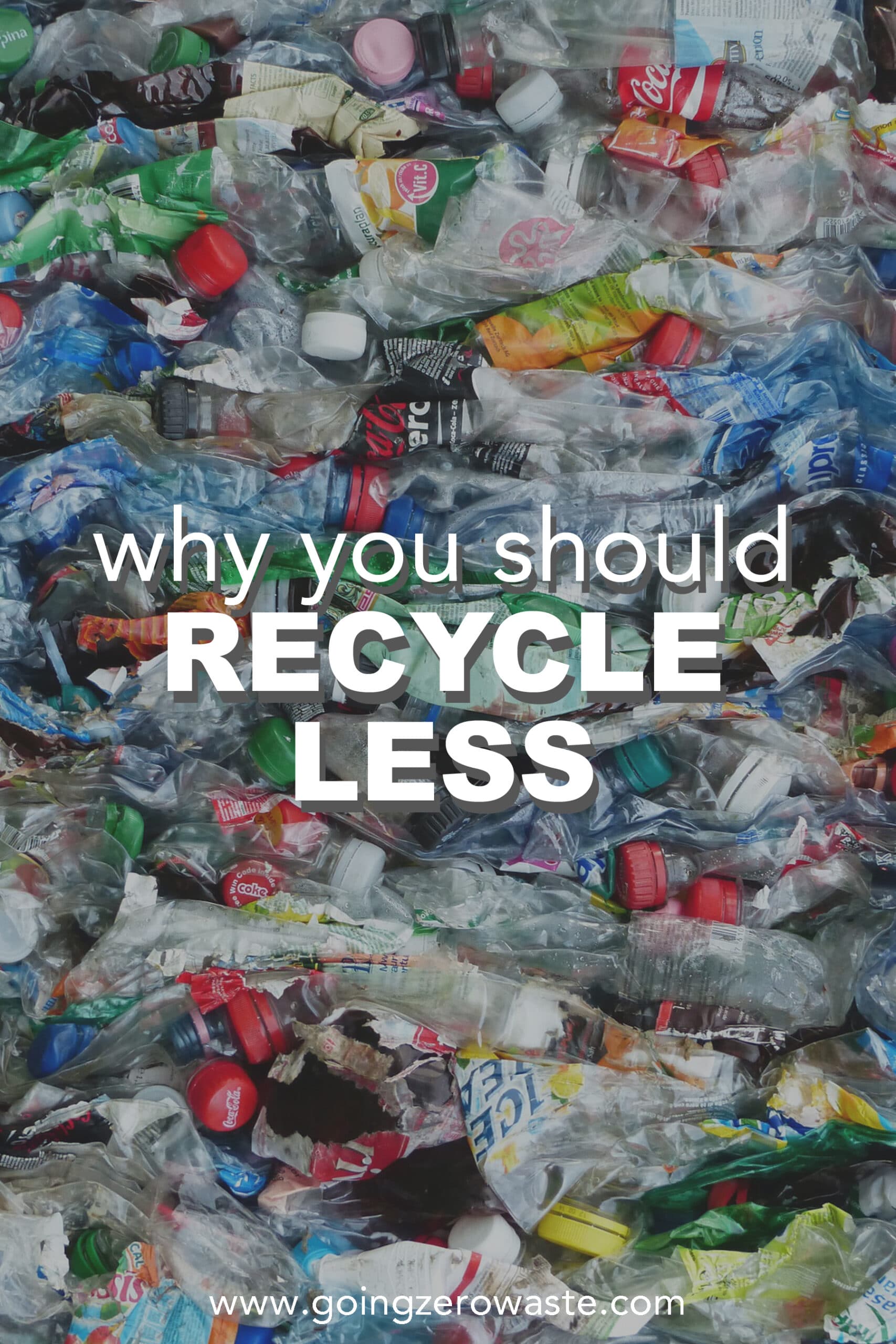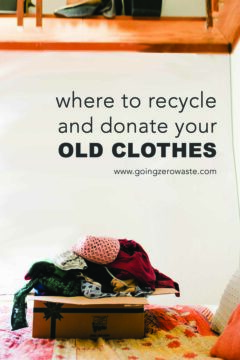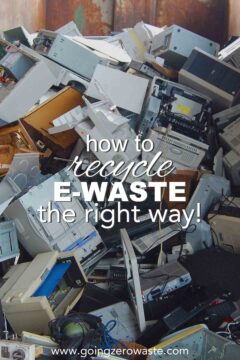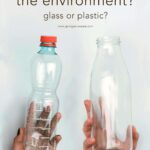Last Updated on January 23, 2024
Have you heard the news? As of January this year, China ban all imports of paper and plastic for recycling that have over a 1% contamination rate.
To put that into perspective, Recology the waste management company for San Francisco, arguably the most advanced recycling facility in the US, has the lowest bale contamination rate in the US averaging 5% per bale.

This means NO current bale meets the current 1% requirement. Plastic only had a 9% recycle rate before the ban…. So, what’s happening with all of our “recycling”?
One of my readers, Michael, sent me this email.
“You’ve inspired me in so many ways this year. I’ve been going zero waste since January 1, 2018 and have been doing great with it.
I am at the point with my household where we only take out one small plastic bag of trash a week. That being said, I would like to hear your expert opinion on something.
It recently came to my attention that the curbside recycling program in my county is sending most of its recycled products to China. From what I’ve gathered, China is the number one polluter of the ocean by a landslide.
This begs the question: do I continue recycling knowing that it’s just going to end up in the ocean, or do I start sending the few recyclables I have to landfill where I know it won’t be killing fish? Of course, I still have many gaps in my knowledge and would love for you to fill in wherever you can.”
First of all, before we delve into this loaded recycling question, I want to say how AMAZING it is that Michael’s household trash is only a small bag a week! That’s awesome! Most Americans fill a 64 gallon bin. Thank you for all of your efforts, you are amazing!!
Now, back to recycling.
Table of Contents
China recycles our stuff?
The US exports 1/2 of it’s recycling, but it’s not just our stuff, they accept waste from Canada, the U.K., and Japan, and in 2016 they received over 7.3 million metric tons of materials. And, they manufactured 74.7 metric tons of plastic.
Almost all of the plastic in the ocean comes from only 10 rivers in the world. I read several conflicting reports but they all average around five rivers running through China.
Everyone agrees that the Yangtze river in China is the worst sending 22 metric tons of waste into the ocean each year.
I made a map of the 10 most polluting rivers in the world. But, is this plastic from our recyclables?
- Yangtze River
- Indus River
- Yellow River
- Hai River
- Nile River
- Ganges River
- Pearl River
- Amur River
- Niger Rive
- Mekong River
why did they stop?
China made an agreement with the UN that they’re working to stop plastic from entering the ocean June of 2017. Around that same time, is when they put the US on notice for not accepting our recyclables. That’s speculation at best, and I’ll let you draw your own conclusions.
What we do know is contamination rates were high. Most Americans don’t do a super great job of paying attention to what they put in the recycle bin. This means much higher contamination rates in the bales. Once everything is baled and shipped to China, the workers there have to sort all of it.
This could result in minor contamination like a little bit of peanut butter left in the jar to major contamination like hazardous household cleaners resulting in poor working conditions and a toxic environment.
recycling is a business.
It’s important to remember recycling is a business not a charity. They’re not doing this out of the goodness of their hearts to save the planet.
They’re doing this to make money.
We the citizen did a bad job at sorting and adhering to the recycling requirements. The waste management companies didn’t do a good enough job enforcing and educating the public on the matter, and decided China could deal with it.
Unsurprisingly, China is fed up with it.
so, what does this mean for me?
It means your plastic and paper are sitting in bales with no place to go and to quote Rogue Waste Systems in Oregon, “Right now, by definition, that material out there is garbage. It has no value. There is no demand for it in the marketplace. It’s garbage.”
what does this mean for the future?
Well, it means we’re going to have to either up our consumption of virgin resources. This is currently happening. But, the earth is already super strapped since we use 1.5 earths worth of resources each year.
OR….
We have to look at zero waste solutions. Recycling was never our savior. Recycling was never the answer. This is going to force a lot of businesses hands, and we’re going to be forced to come up with new solutions.
Maybe China has ushered in a new era of recycling? Right now, there is more awareness on plastic pollution than ever before. Mix this with a ban on recycling and you’ve got a perfect storm for change.
So, Michael, should you just toss your recyclables in the landfill bin?
I think you’re still fine when it comes to everything except plastic. When it comes to plastic, I don’t know. That’s a really hard judgement call to make.
A lot of curbside programs aren’t even accepting it anymore. First, thing I would do is get talk to my plant manager and ask them what their goal is?
Are they trying to reach the 1% contamination goal? Are they looking at other recycling solutions?
Based on how they answer is based on how I would react. Some recycling companies have sent out notices letting everyone know their plastic is now non-recyclable and is trash.
Only time will tell what will happen. Recyclables are piling up everywhere. So let us hope this leads to global action to reduce our plastic usage.
Reducing our dependence on plastic and focusing on reusable items instead of items we use once then throw away are the best things that we can do on the planet right now.
Check out my guide for the ultimate list of zero waste swaps and if you’re looking for a place to start, check out my post on the big four.
I’m curious, what would you do? How will you handle your recyclables now that there’s a ban? Have you had any of these conversations with your waste management plant?
Sources and further reading:
- https://www.npr.org/2017/12/09/568797388/recycling-chaos-in-u-s-as-china-bans-foreign-waste
- https://www.wastedive.com/news/what-chinese-import-policies-mean-for-all-50-states/510751/
- https://earth911.com/business-policy/china-ban-plastics/
- http://www.dw.com/en/almost-all-plastic-in-the-ocean-comes-from-just-10-rivers/a-41581484
- https://www.ecowatch.com/80-of-ocean-plastic-comes-from-land-based-sources-new-report-finds-1891173457.html
- https://www.wsj.com/articles/america-is-no-1-in-exporting-trashwhat-if-no-one-wants-it-anymore-1507483011
- https://qz.com/1004589/80-of-plastic-in-the-ocean-can-be-traced-back-to-asias-rivers-led-by-china-indonesia-myanmar-a-study-by-netherland-based-the-ocean-cleanup-found/
- http://bigthink.com/robby-berman/where-is-the-plastic-in-the-ocean-coming-from-try-asia
- http://www.bbc.com/news/science-environment-40195664














As long as you are recycling what is ACCEPTED for your municipality, I think it is still the right thing to do. That is the only way they will be able to gauge consumption and make informed decisions about what to do. I know curbside recycling is so different region to region, so it’s important to know the rules for your area.
I hadn’t heard about the ban. I am working to limit my waste, but I still have a lot (mostly food packaging). Im going to try to buy things in a non plastic container if no bulk option is available.
I don’t think recycling OR reuse is going to work until the manufacture of things from new materials becomes more expensive than the alternatives. There are sooooo many people who will say, "well if it can’t be recycled that’s a shame but I’m not bothering with that re-use business, if I can’t recycle it then I’ll just throw it out." Unfortunately, the solution I see is upping the price of goods or upping the price of throwing things away. Neither of these is a ‘solution’ unless it’s enforced by laws, because in our open competitive market, no one’s going to intentionally raise the price of their goods unless they have to.
Currently, my only plastic waste is from pre-packaged tofu/meat substitutes and tortilla chips (I can’t get them in bulk). I also send some fruit stickers to landfill. I send approximately 8 plastic bags to recycling every month, but the rest of my recycling is cardboard, paper, glass and aluminium cans.
I think it’s easier to stop using plastic that a lot of people realize. Many companies are now making products in glass rather than plastic. I know that there is the issue of availability and cost, and if those are prohibitive in your area, I think it’s beneficial to contact the stores/management and ask for alternatives. Many mom and pop groceries are willing to bring in special order items, especially if they realize the reason behind it!
I think recycling is still the way to go IF the only option is recycle or landfill. However reducing plastic use and purchasing products in more valuable recyclable materials (glass and aluminium) is one step better!
If you can get money for it, then it’s worth recycling. Not that you have to get the money… but if someone, somewhere is willing to pay for the used materials, then you can bet that the product is being re-used. Aluminum is the best to recycle. Steel and tin are good, cardboard and newsprint are also profitable. The last I heard, glass was kind of a break even. Plastic actually costs more to recycle than to manufacture from scratch so it has been doomed all along.
I am visiting New York at the moment, I was told by one hotel we stayed in that they have to recycle, it’s the law! But they didn’t have recycling bins for guests, and I have seen so many cafes etc that use plastic cutlery and plastic cups, plates, containers for take away, and I don’t see them go into recycling. We have avoided these places where possible, bought our own cups and cutlery. I can’t see these businesses changing unless they are forced by changes in the law.
I live in Michigan where we have a 10 cent return on most plastic/glass/aluminum cans. But now I’m curious to see where it goes after I’ve deposited it. Thank you for bringing this into light!
Please write about terracycle. They recycle everything. Everything.
Private program and sometimes you can sign up, for free to have like.. lays. Cover your shipping cost to recycle chip bags. Things like that. Otherwise you pay for the cost to have it recycled. Strange, but covers the cost to not reject anything.
There IS a way, please don’t tell people that recycling is bust or else it’s going to end up in the ground!
I have an idea of how to reuse old furniture instead of discarding it. Upholstering is rather expensive and not always suitable. A good idea is putting a new beautiful cover over your sofa, armchair, table or whatsoever. It’s much cheaper than upholstering or buying new furniture and it prevents your furniture from going to waste! I once bought a sofa cover at alcocovers.com, it’s pretty good!